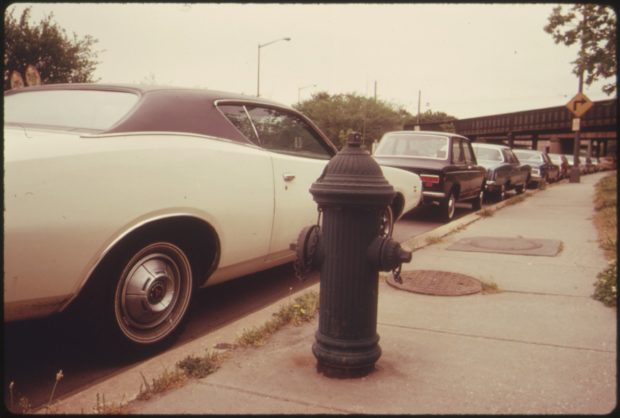That same old woman who had used an axe
to chop apart the vacant corner house
until the L&I ball leveled it
scanned the street for all authorities,
then turned a make-shift wrench. The hydrant sprayed.
The asphalt turned as black as cellar coal.
She propped a folding table near the plug
to scale the gutted bluefish in the sun,
the entrails streaming to the culvert, blood
turning her house dress to a butcher’s smock,
the gray scales plastered to her flabby arms.
You must remember who this fossil was—
a stout old German come to rule those streets,
knowing everybody’s gossip first,
spreading the rumors that could ruin men,
collecting cash for Mass cards or for hot
merchandise she’d hide in steamer trunks.
So times like these, you gave the floor to her.
Then Stella ordered kids to run fillets
to neighbors’ steps and local taproom doors
until the whole block stank like tuna tins.
She gave each fish away but knew, in turn,
she’d get to pay her street numbers on time
and have the neighbors bring her blood pudding
when Deli Dan’s, just up the block, ran out.
You should have heard those passing truckers honk.
The sprinkler mist still pumped at passing cars.
And suddenly, when every fish was wrapped,
she kicked off soggy slippers, gave a clap,
and held off traffic with her palm. She hiked
her hem, a burlesque starlet on the stage,
a flapper once again, except that now
she pulled a bar of Lava from her pocket
like some vaudeville magician— and she scrubbed,
her weighty bosom heaving with the suds
until her dress was clinging gauze on flesh
that oozed and stretched from a hundred fatty rolls.
I know by now you want to look away,
but try to hear that crowd who cheered the show
on a hot, filthy street in Kensington.
When a cop rolled his sleeve and leaned to her,
offering a courteous end to the antics,
she pulled him under. “Give the gent a drink.”
To our surprise, they danced a waltz, a jig,
and then a mummer’s strut; her lawn chair bobbed
above her head like a captain in the fancies—
two dancers in an Esther Williams film
who shocked the star and never made the cut.
Now think of that patrolman and the jolt
of being caught in a wet spotlight— just him,
a soaked-through uniform, and a half-nude hag,
but somehow reveling in all the screams
and whistles we could muster. Soon they came,
the firemen who took the wrench and turned
off the fire plug as if it were a key
to an old music box that slowed then stopped.
David Livewell grew up in Philadelphia and won the 2012 T.S. Eliot Award for Poetry for Shackamaxon (Truman State University Press). He is now at work on a second collection.



No Comments